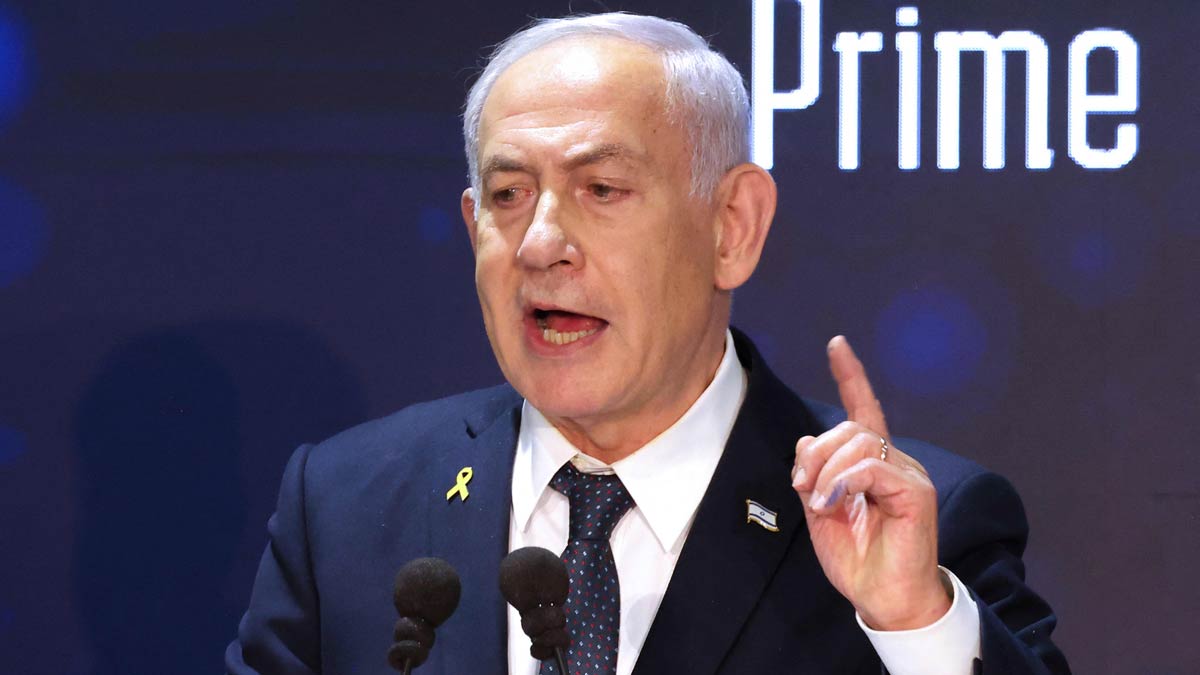Turkey-Israel ties strained further amid Syria conflict, arms race
 Israel Prime Minister Benjamin Netanyahu speaks during a conference on antisemitism in Jerusalem | AFP
Israel Prime Minister Benjamin Netanyahu speaks during a conference on antisemitism in Jerusalem | AFP
Ties between Turkey and Israel, once marked by strategic cooperation, have reached a new low amid growing military competition and sharply divergent interests in war-ravaged Syria.
Israel is unhappy about the unqualified support Turkey is offering Syria’s new interim government led by Ahmad al-Sharaa. Ankara has stepped up its presence in Syria after the outbreak of sectarian violence between Bedouin Arab tribes and Druze militias in Sweida province. Upon Syrian request, it is working on a defence pact that could involve the establishment of Turkish military bases on Syrian soil.
Turkish officials said the assistance, which includes training, advisory services and technical support, is aimed at boosting Syria’s defence against terrorist groups like the Islamic State. Ankara also backs the integration of Kurdish-led Syrian Democratic Forces (SDF) into the national army, although the deal’s implementation remains in limbo.
But Israel, alarmed by Ankara’s growing influence in southern Syria, launched airstrikes in Sweida and on Damascus’s Ministry of Defence last week. Israeli officials claimed the attacks were intended to protect Druze communities in Syria, in solidarity with Israel’s own Druze minority.
President Recep Tayyip Erdogan lashed out at Israel for what he described as a cynical justification. “Israel, using the Druze as an excuse, has been expanding its banditry into neighbouring Syria,” he said during a televised address, branding the country a “terror state”.
The breakdown in trust is not new. Although Turkey was the first Muslim-majority nation to recognise Israel in 1949, and developed close defence and intelligence cooperation by the late 1990s, under Erdogan’s rule, Ankara has adopted a more Islamist and anti-Western foreign policy. Tensions began escalating in the mid-2000s, particularly after Erdogan hosted leaders of Hamas in 2006, and worsened dramatically after the 2010 flotilla incident, when Israeli commandos killed nine people aboard a Turkish vessel heading for Gaza.
Over the past year, relations have deteriorated further. Israel’s military dominance in the region, particularly its recent operations against Hamas, Hezbollah and Iranian forces, has unsettled Turkey. Conversely, Israel views Turkey’s increasing support for Syrian rebel groups, some of which are tied to designated terrorist organisations, as an existential threat.
Jerusalem is particularly concerned about Ankara’s military build-up. Turkey recently signed a deal with Germany to acquire 40 Eurofighter Typhoon jets, marking a significant upgrade of its air force. An Israeli defence official told a local newspaper that while the Typhoons are not superior to Israel’s F-35s, they represented a worrying trend. “It’s a clear and worrying signal that Turkey is accelerating its arms buildup in a way that could eventually challenge Israel’s military edge in the region,” the official said.
Turkey is also pursuing US-made F-16s and has revived its interest in rejoining the F-35 programme. These efforts, coupled with Ankara’s expanding naval and drone capabilities, have sparked alarm in Israeli policy circles.
Israeli opposition leader Yair Lapid criticised the Netanyahu government for its inaction. “If Israel had a functioning Foreign Ministry or a normal government, it would have already intervened diplomatically to prevent this arms deal from advancing,” he said. “Germany and the UK are now equipping Turkey with powerful jets that could eventually alter the balance of power in the region.”
Middle East